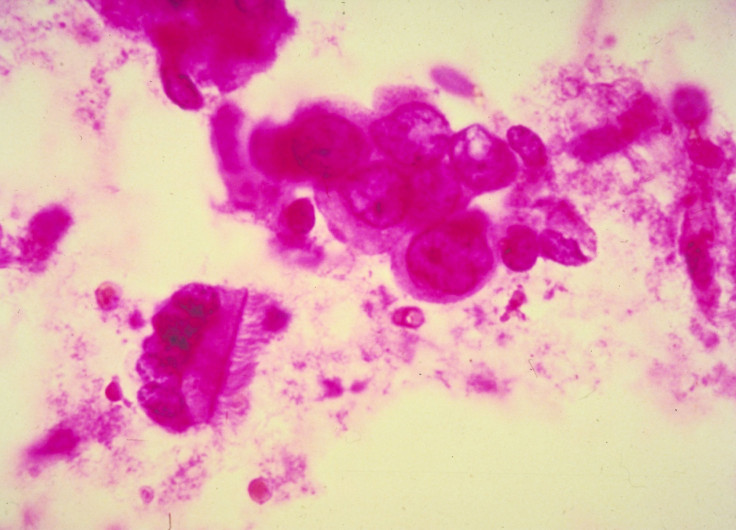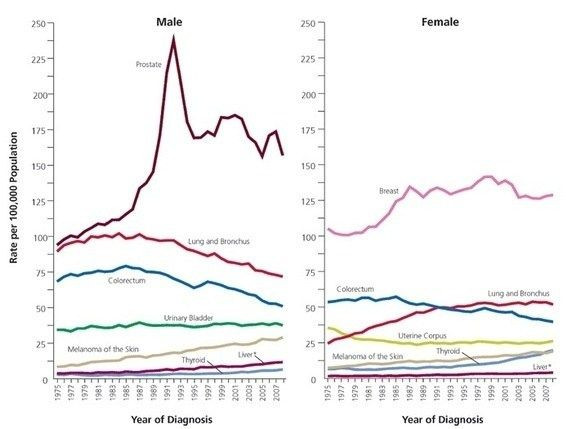Cancer Trends 2017: Why Are Cancer Rates Increasing?


This question was originally published on Quora. Answer by Ray Schilling.
- The cancer rates have increased over the years. Why are cancer rates increasing? But the biggest factor for this is that we live a lot longer. Our mitochondria are getting weaker as we age and this can trigger mutations that lead to cancer.
- But we are also learning about protective factors like vitamin D3, selenium supplementation, exercise to maintain your body function and stimulate your immune system. We even can change the composition of our bowel bacteria from bad bacteria to good bacteria by eating less meat (particularly red meat and processed meats), more fruit, vegetables and probiotics.
- The techniques for diagnosing cancer early have improved. So when cancer is diagnosed it can be treated at an earlier stage where it can be removed totally. New immune-stimulating therapies are also being developed. This means you can have it both ways: live longer and yet not die of cancer.
- Take lung cancer: for men lung cancer is coming down, because men as a group have quit smoking, but women as a group are still increasing smoking:

You see from this figure how there is a lag time from cigarette smoking to lung cancer. The male death rate from lung cancer is just starting to come down, but women are still increasing their death rate curve from lung cancer. Usually 15 years after quitting smoking the effect of previous cigarette smoking is no longer visible statistically (meaning the lung cancer risk went back to zero).
5. Other cancers: uterine cancer, breast cancer, prostate cancer, colorectal cancer. This is depicted here over time:

So, you can see that cancer is a very diverse entity.
You are asking: How has the percentage of people diagnosed with cancer changed over time? I explained this for lung cancer under point 4. But for prostate cancer there has been a huge increase that was made possible by the PSA blood test. So the peak you see is the effect of using PSA testing in males since the mid to late 1980’s. This made it possible for physicians to diagnose prostate cancer much earlier, but also the survival from prostate cancer has improved, because you can treat it more effectively when treated early.
With breast cancer in women this is also true since introducing mammography. But there are more complicated factors like BPA exposure from the environment, hormone treatment with synthetic hormones instead of bioidentical hormones.
Uterine cancer in women has come down, because gynecologists won’t mess around with heavy bleeding, but do a biopsy and if it is positive for cancer do a hysterectomy. This treats any early uterine cancer effectively.
The PAP test has virtually wiped out cervical cancer, because effective treatment methods can be used in an early stage.
Colorectal cancer has its own history: colonoscopy screening has changed the whole colorectal cancer scene. You can detect polyps long before they turn malignant and this prevents colorectal cancer. But those who are negligent in doing colonoscopy screening still die of colorectal cancer.
Conclusion
As we have a longer life expectancy than in the past, we get the diseases of old age like cancer, Alzheimer’s disease and heart disease. Bypass surgery and angioplasty with stent placement has prolonged our lives by perhaps 10 years. But now we have to watch that cancer does not get us.
To answer your question: Yes, the percentage of people diagnosed with cancer has increased over the last few decades, largely because we survive longer. But medicine has developed sensitive tests that diagnose cancer earlier, so this can also contribute to the cancer diagnosis and make the statistics look even more pronounced. But we need sensitive cancer tests to treat cancer before it is too late to treat. This way more people will survive cancer.
More from Quora:



























